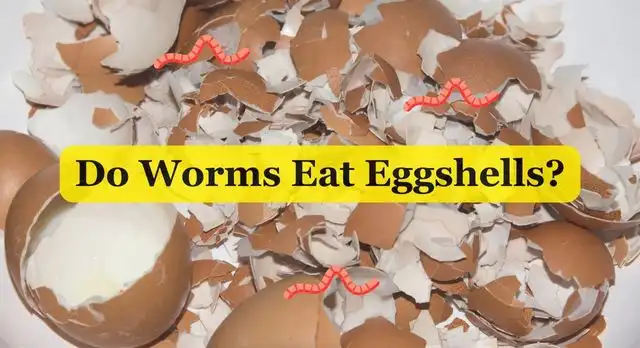Do Worms Eat Eggshells? The Role of Eggshells in Vermicomposting
Are you wondering what to do with those leftover eggshells after breakfast? Well, you might be surprised to learn that worms can play a valuable role in recycling them. Yes, worms have a voracious appetite for organic matter, and eggshells are no exception. In this article, we will explore the fascinating relationship between worms and eggshells and answer the question, “Do worms eat eggshells?” So, hold onto your egg cartons and let’s dive into the world of vermicomposting together.

Do Worms Really Eat Eggshells?
Yes, worms do eat eggshells, but it’s important to understand how they consume and utilise them. Worms have a gizzard, a muscular organ in their digestive system, which helps them grind and break down food. Eggshells, being primarily composed of calcium carbonate, provide an important source of calcium for worms. While worms do not consume eggshells directly, they ingest small particles of eggshell mixed with other organic materials, and these particles aid in their digestion.
Benefits of Adding Eggshells to Vermicomposting
Calcium Enrichment: Eggshells are rich in calcium, which is an essential nutrient for plant growth and development. By incorporating eggshells into your vermicomposting system, you are infusing the resulting compost with valuable calcium, which can benefit your garden or potted plants.
- pH Regulation: Eggshells have a slightly alkaline pH. When added to acidic environments, such as vermicompost bins that contain acidic food waste, eggshells can help neutralize the pH and create a more balanced and favorable environment for worms and beneficial microbes.
- Slow Release Nutrients: Eggshells break down slowly, releasing their nutrients gradually over time. This slow release ensures a steady supply of calcium and other trace minerals to plants, providing long-term benefits for their growth and overall health.
- Pest Control: The abrasive texture of crushed eggshells can act as a natural deterrent for certain pests. Sprinkling crushed eggshells around plants can help ward off slugs, snails, and other soft-bodied pests that may cause damage to your garden.
How to Prepare Eggshells for Vermicomposting?
To make eggshells more suitable for vermicomposting, it’s important to prepare them properly. Here’s a simple process to follow:
- Clean and Crush: Rinse the eggshells thoroughly to remove any residue. Once dry, crush them into small pieces or grind them into a fine powder. Crushing the eggshells increases their surface area, making them easier for worms to consume.
- Bake or Boil: To further sterilize the eggshells and eliminate any potential pathogens or harmful bacteria, you can choose to either bake them in the oven at a low temperature (around 200°F/93°C) for 10-15 minutes or boil them in water for a few minutes. Allow the eggshells to cool before adding them to the vermicomposting system.
- Mix with Organic Waste: Incorporate the crushed or powdered eggshells into your vermicomposting bin along with other organic materials, such as fruit and vegetable scraps, shredded paper, or coffee grounds. Maintaining a balanced mixture of carbon-rich “brown” materials and nitrogen-rich “green” materials is crucial for successful vermicomposting.
Key Takeaway
Eggshells can serve as a valuable addition to your vermicomposting efforts. By incorporating eggshells into your vermicomposting system, you provide worms with a source of calcium while enriching the resulting compost with essential nutrients. Eggshells also contribute to pH regulation, slow-release nutrient availability, and natural pest control. Remember to prepare the eggshells properly by cleaning, crushing, and sterilizing them before adding them to the vermicomposting bin. By utilizing eggshells in vermicomposting, you can make the most of this kitchen waste and contribute to a more sustainable and nutrient-rich soil environment.
So, the next time you crack open an egg, think twice before tossing away those eggshells. Let the worms do their work and witness the transformation of kitchen scraps into valuable compost for your garden. Vermicomposting with eggshells not only benefits your plants, but also reduces waste and fosters a more eco-friendly approach to recycling.
Related Article
Do Earthworms Eat Coffee Grounds?
Do Worms Eat Leaves? Unveiling the Habits of Earthworms
FAQs
How do you feed eggshells to worms?
To feed eggshells to worms in a vermicomposting system, rinse and dry the eggshells, then crush them into small pieces or grind them into a powder. Sprinkle the crushed shells over the bedding in the worm bin, mixing them with other organic materials like fruit and vegetable scraps. Monitor the worms’ response and gradually increase the amount of eggshells over time if they consume them well. Remember to maintain a balanced diet for the worms by avoiding excessive amounts of eggshells and providing a variety of organic materials.
Do eggshells attract earthworms?
Eggshells themselves do not attract earthworms. Earthworms are more attracted to organic materials that are easier to consume, such as fruit and vegetable scraps or decaying plant matter. While earthworms may consume eggshells as part of their diet, they are not specifically drawn to them. Other organic materials provide a more favorable food source for earthworms and support their nutrition and digestion.
